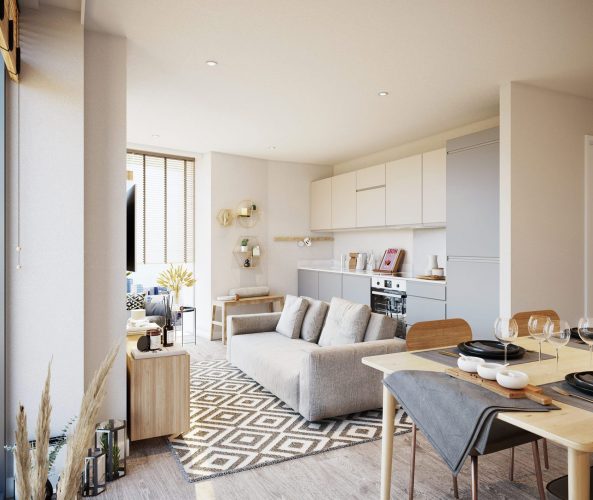Investing in real estate can be a lucrative source of income, but when it comes to residential vs commercial property, deciding which is better for you can be difficult given how broadly these two sectors vary.
While commercial property investment can be more profitable in the long run, there are more initial costs and paperwork to deal with in comparison to investing in residential property.
In this guide, the BuyAssociation team covers everything you need to know about residential vs commercial property investment. We’ll discuss the key differences between the two, as well as the pros and cons of each investment type, to help you decide which option is best for you.
Residential vs commercial property: What’s the difference?
If you’re considering making a residential or commercial property investment, understanding the difference between the two so you can make an informed decision is essential.
A residential property is usually intended as a home for individuals or families and includes flats, terraced houses, semi-detached houses, and detached houses. Most people who invest in residential property but don’t occupy the property themselves will rent it out to others so that they can generate income from the property.
A commercial property, on the other hand, is used solely for business purposes, and can include offices, warehouses, retail spaces, restaurants, and more.
Commercial property owners might choose to run their own business out of their space, but most investors in such properties tend to lease them out to other businesses. A lot of companies prefer to rent a space rather than buy one as this allows them to save money, which can then be invested elsewhere in their business.
Typically, an investor can expect to see the following differences between the two property types:
| Residential | Commercial | |
| Profit | Lower | Higher |
| Initial investment | Lower | Higher |
| Length of lease | Shorter | Longer |
| Paperwork/admin | Less | More |
| Maintenance | Landlord (usually) pays | Tenant (usually) pays |
| Rent payments | Monthly/weekly in advance | Three months+ in advance |
The pros and cons of residential vs commercial property investment
Weighing up the advantages and disadvantages of investing in residential vs commercial property can be incredibly useful in helping you decide which property type would best suit your budget and lifestyle.
Let’s start with the pros and cons of investing in residential property:
Pros of being a residential landlord
- It’s much easier to get a mortgage on a residential property than it is on a commercial property. Additionally, the interest rates for buy-to-let mortgages are usually lower than for commercial mortgages.
- Initial investment costs are much lower on buy-to-let properties than on commercial properties. Mortgage deposits for residential properties are usually just 25%, making it much easier to get your foot on the property ladder.
- As house prices continue to rise, demand for rental properties will continue to increase. This high demand means that people act quickly when they find a property they like, so you won’t have to worry about your property being unoccupied for long periods of time.
- The buying process is much faster for residential properties, with there usually being a much shorter amount of time between purchasing and the tenants moving in. This means that landlords can usually expect a quicker return on their investment.
- There is a smaller financial risk when investing in residential property compared to investing in commercial property, because your outgoings will be much lower. Although there is the risk that tenants could fall behind on rent payments, residential tenants are typically quicker to replace than commercial tenants.
Cons of being a residential landlord
- There are often more ongoing costs with residential properties, because the landlord is responsible for the maintenance of the dwelling.
- You might find that tenant turnover is quite high due to residential leases being only six or 12 months. Landlords therefore risk losing income every time a tenant moves out, plus there’s also the additional cost of re-advertising the property.
- Residential landlords can expect a lower return on investment than commercial landlords because the rent is so much cheaper. Plus, an additional stamp duty surcharge must be paid on buy-to-let properties, which will also eat into your profits.
- Residential properties to invest in can be hard to find and are usually snapped up quickly, especially in sought-after areas where rental yield is particularly high. This is where organisations like BuyAssociation come in, helping residential landlords access some of the best property developments and unique investment opportunities before anyone else.
By comparison, the pros and cons of investing in commercial property are as follows:
Pros of being a commercial landlord
- Established businesses usually stay in the same commercial space for longer periods of time, which means more financial security for the landlord.
- Return on investment is usually higher for commercial buildings because the rent is higher, plus there’s the extra earning potential of having multiple businesses in one building or flats with separate leaseholds.
- In most cases, commercial landlords aren’t responsible for any repairs or insurance, with this responsibility instead falling to the tenant. Commercial tenants will usually pay for and arrange the repairs directly or via an additional service charge.
- As a commercial landlord, you’ll usually only have to work during business hours. By comparison, residential landlords can be on call 24/7 and might have to resolve issues with the property outside of working hours.
- Because commercial tenants are usually professional business owners, landlords don’t have to worry about the property being left in a poor condition. Commercial tenants also go through a much more extensive background check than residential tenants, so they’re likely to be more reliable and trustworthy.
- Commercial tenants usually pay three months or more in advance, which means commercial landlords have a cash flow advantage over residential landlords.
Cons of being a commercial landlord
- Purchasing commercial property requires a much greater initial investment than residential property. You will need more money for the mortgage deposit and for any work the property needs before it can be leased out.
- If your commercial property is vacant, you will have to pay business rates. This could be expensive if your property is empty for a long period of time.
- Commercial properties are more expensive to keep, with additional regulations for fire escapes, automatic vents, and dry risers potentially costing thousands.
- There is a significantly lower demand for commercial properties in comparison to residential properties, which are always in high demand. Many businesses now operate a ‘work from home’ policy in the wake of the COVID-19 pandemic, reducing the demand for office spaces.
- Commercial landlords will have to spend significantly more time completing admin and paperwork due to the complex nature of commercial leases. Most commercial landlords hire lawyers to help with this, which is another potentially large cost to consider.
- The interest rates for buy-to-let mortgages on commercial properties are usually around 6% higher than a residential loan.
Are you a landlord looking for advice on purchasing or selling property? If so, you’re in the right place. Get in touch with the team and we’d be happy to talk.
Why invest in property?
The financial rewards that come with being involved in the property sector are unmatched, especially in the UK. Purchasing residential or commercial property is a great source of income and a secure investment for your future, with landlords often seeing a high return on investment from rental income and capital gains.
There has been a strong upward trend in property prices over recent years, with the latest research from the Office for National Statistics showing that UK house prices increased by 9.8% in 2022. This demonstrates the ongoing stability of the UK property market despite the challenges seen towards the end of last year.
We’ve seen a staggering 333% increase in house prices since 1988, and experts suggest that there is no sign of this slowing down. It’s a great time to invest in property, with lending trends demonstrating a strong buy-to-let market and unprecedented levels of tenant demand.
This is all a clear indication of the opportunities that may arise for investors, which is where BuyAssociation comes in. We specialise in bringing together investors and property developers at the earliest stages of development, identifying investment opportunities and funding renovations and new-builds throughout major UK cities and towns. Using our unique position in the property market, we can help you access some of the best property developments and unique opportunities before anyone else.
Stay ahead of the market with BuyAssociation
At BuyAssociation, we provide exclusive access to best-in-class properties for investors, first-time buyers, and owner occupiers in prime locations before they go public. We only seek investments that we anticipate will have high returns in order to best serve our clients.
When you partner with BuyAssociation, you gain connections to discounted residential properties sourced directly from some of the country’s most reputable developers. Our intent is to put our clients’ objectives at the forefront and ultimately to elevate their success, which is why our investment service is exclusively personalised.
Our experienced team of property specialists knows how important it is to source one-of-a-kind properties that meet the specifications of our clients. Through a combination of our group’s unique market positioning, solid industry knowledge, and buying power, we identify high-value investment opportunities and share them directly with investors.
Join over 30,000 of the world’s most informed property investors who are already working with BuyAssociation to access expert advice and unique property investment opportunities directly from leading developers across the UK.
Browse our available investments or contact us to find out more about our exclusive investor community.









